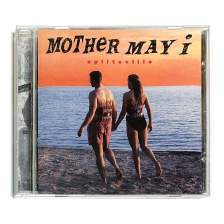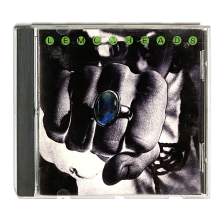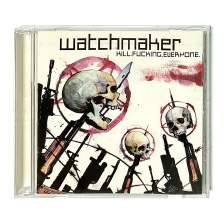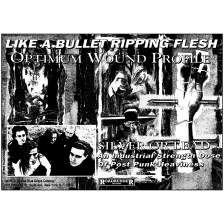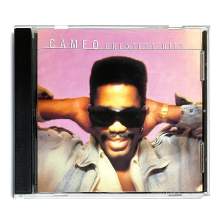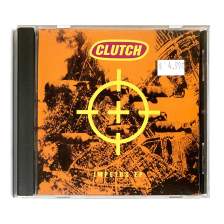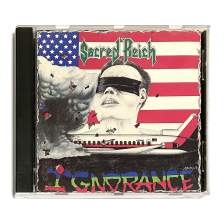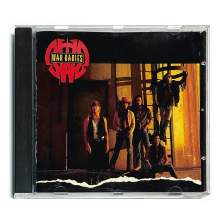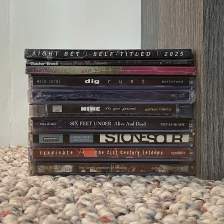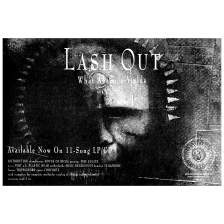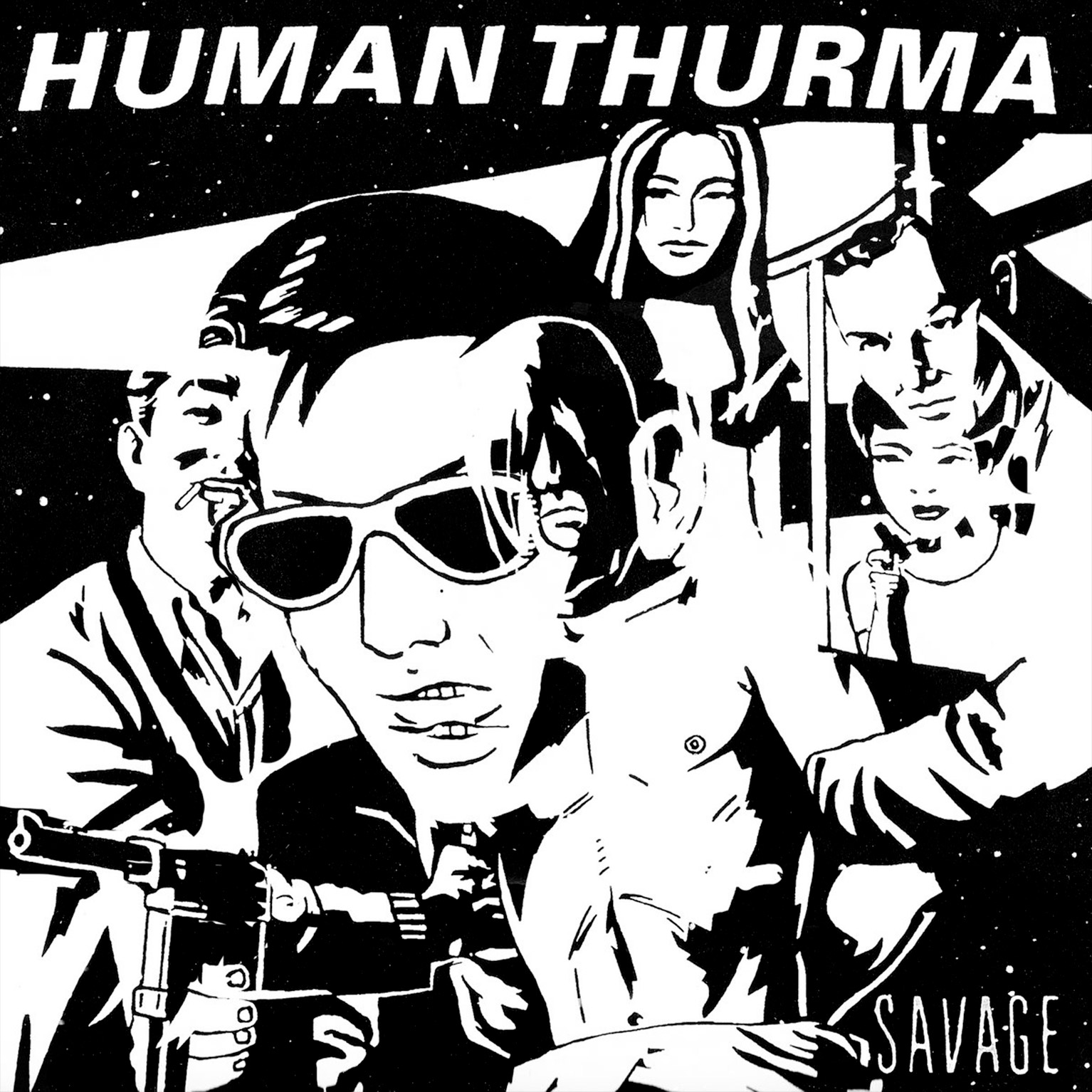
A few weeks back, I was rather gobsmacked when a flyer crossed my path on Instagram hyping the November 24 return of unsung Richmond, VA math metal greats Human Thurma, playing their first show in probably 25 years. I was further shocked—and even more excited—to learn that the group was about to release a 14-song not-quite-discography CD/LP called Savage (pre-order now, whydontcha), compiling tracks recorded between 1996 and 1998—mostly with Mark Smoot, plus a handful with Tim Green at Louder Studios in San Francisco—roughly half of which appeared on a demo and some 7"s, while the rest were never even released!?
One of the few bands of their ilk that I actively followed back in the day, I must confess that having not revisited Human Thurma's work in some time, their peculiarly angular, noisy, but not overly experimental take on the genre piques my interest now more than ever. For a city with beyond a decent reputation for math rock/metal, it sure seems that Richmond has had an awful lot of excellent music from within such parameters fly largely under the radar for far too long.
So, I threw together an interview with bassist/vocalist and underground music lifer Trevor Thomas to gain a little bit of the Human Thurma backstory, as well as some reflection on what the Richmond scene had to offer decades ago (and continues to present today)...
HRM was just barely before "my time," and despite lineup ties, I don't know that I ever realized that HRM was technically the first incarnation of Human Thurma—to the point where I now see that Human Thurma re-recorded a few songs that had originally been on the HRM demo. What's the CliffsNotes version of HRM morphing into Human Thurma around 1996 or so?
I moved downtown in the summer of '93 to go to school and all I really wanted to do was go see bands. I was really hellbent on starting a band. I could take you on a wild ride as to what the early- to mid-'90s was like for me. Bottom line, I saw a ton of great bands and that set the course for how my life has been.
One of the Richmond bands that really had something going on was the Jolly Mortals. It was like... a little kid was driving a tank. And that tank just rolled over everybody. The band steamrolled the crowds at their shows. They had a heavy, poppy sound, a playful malevolence, and had these songs I just loved. I said, "I want to do a band with this guy," the guitar player/singer, David DiDonato. He was wild, you know, just cherub devil.
I rehearsed with a few bands over the next couple years, checking out the scene. It was a pretty interesting mix in town. I was also playing in a trio with the soon-to-be HRM drummer Erik Josephson. He and David had been tapped to join another great Richmond hardcore band, Ipecac, in late-'94. I was recording bands with my 4-track and ended up recording Ipecac's last practice the day of their last show in a space Erik and I played in, New Year's Eve '94/'95.
I think the Jolly Mortals had broken up and Ipecac had broken up and they were doing a different Jolly Mortals band for a spell... then somewhere in there, around summertime, I was asked to join this new band David and Erik were starting called HRM. This was really like some kind of young man's supernova. These bands imploded and what came out of it... it was like being shot out of a cannon and being really into it. We had a chemistry, and what came out of that was that feeling we could just play any kind of wild... "punk metal angelic steamroller music." David had all these weirdly catchy melodies and Erik and I would just pound them out without skipping a beat. Erik is a rock-solid drummer and we both really got David's odd sensibilities. It was fascinating to behold. That was one of those bands that could have really blown up, and I guess it did, so to speak... like a roman candle. David had an appetite for starting tons of bands, and I think that kind of thing had run its course for him for the moment to a certain degree.
Meanwhile... my pilot light had just started to get warmed up, and I was settling into the feeling that we had a thing going on. I really felt like that was what I was supposed to be doing. So, when he effectively quit the band, I felt we had created something that needed to keep going. It had only been a year and we were starting to get good shows. Our last show with him was with Cathedral, just us two bands, and when we were done Lee Dorian was like, "What do we have here???" He took me backstage and smoked us out. I mean, I was 21 at the time and just getting started.
What came next was about the most natural transition I could have imagined that was a product of all the social knitting that had taken place during this time. It's a very long chapter, but while this was going on I had befriended Sean Harris, the singer of one of "the fall of '93" bands I really connected with called Ladyfinger. I had seen them quite a few times and was just really into it. I met Sean after a Caspar Brötzmann Massaker show at [legendary but now defunct Richmond club] the Flood Zone and we just hit it off. We got to be pretty good friends and by the summer of '94, I was working at [Italian restaurant] Mamma Zu which not only employed Mr. Harris, but Ladyfinger (and Sliang Laos) guitarist Ron Dimmick. So, here I was in this... den of iniquity... pretty much growing up right out of high school with these devious and creative minds.
Sean was a bass player in Butterglove and quite a number of other bands, and was also a pretty sick guitar player. I think we started fucking around with some of his songs at some point for a solo show of his, and this was going on while HRM was doing its thing. He came and saw HRM and, you know... it's just funny how that stuff works out. Next thing you know... we're like... "Hey... do you want to give this thing a go over here?" And it just clicked. The band seemed to Bruce Banner overnight.
I kinda had my head up my ass from 1995 - 1998 in terms of music that I was open-minded to, so while I was "there" to a degree, I missed out on so much with the local scene. Having been much more directly involved in this niche, and for a few years longer than I, what would you say are your general memories or takeaways from what was going on with this type of underground music in Richmond during the age of Human Thurma?
Richmond has its class of punk rock '80s that continued to make some very cool and inspired music going into the '90s, but perhaps felt indifferent to what was really happening in the '90s at the end of the day. We're talking... getting signed beyond handshake deals, making demos aimed at labels, going on club tours, self-promotion—all of which I could and can still understand as being trappings for making art and being recognized or at least taken seriously. I watched a very wicked local music scene have its moments only to feel like by '95, the romance with "the '90s" was all but about over. Again, I was hunkering down for a long winter in music, I saw the bubble up of many of Richmond's great bands at the time and then we started to enjoy our own sort of... we're not playing locals-only shows... we're only playing shows with bands that are forces of nature and that we're into.
It had been a good many years since I'd broken out any of the Human Thurma recordings. Listening back now in the context of this larger 33-minute collection, it's really striking me how the band deserves to be more highly regarded as part of Richmond's esteemed legacy of "math metal." It feels like when that scene gets mentioned it's usually stuff from 1989 - 1993 that gets the most shine; whereas what came right on the heels of that era like Human Thurma, Nudibranch, etc.—where you can totally hear the threads—seems largely forgotten beyond locals. But, again, Mr. Head-up-ass here, maybe I'm wrong. I know you're not gonna sit there and say, "Yeah, we were great, we should be legends!" But, from the inside—at the time or looking back—does it feel like a lot of cool shit just didn't quite catch on?
"Yeah, we ARE great, we should be legends!" I think the newer-forming bands of that time... everybody was cool [laughs] and yet, we didn't really have an area champion of this kind of music. And those kinds of people became legends elsewhere for galvanizing scenes and putting bands on the map. They made them catch on! "These worms are gonna get on these goddamn hooks!" I'm talking like Thomas Hazelmyer moving FROM Seattle to Minneapolis in the '80s and really making something out of bands in both those cities and beyond with Amphetamine Reptile... and he's still at it. We didn't have that here. We had some attempts at rallying our little universe, like [music conference] Route 1 South, for example. I think there's a lot to this story that can't be dispensed in a way that gives the whole sensation. And so either these sick bands break up before catching on, or they make a break for it... then they realize... this is hard work! This is a marathon of involvement. Once you leave your zip code, you've got to be ready to prove it. And you don't get the accolades that often fuel the growth of a band entity, you have to create your own rewards or find them in aspects of it that might not register as a reward for most people... to keep going. I also feel that the "catching on" is not just the work of a band, but also of the champions of the band.
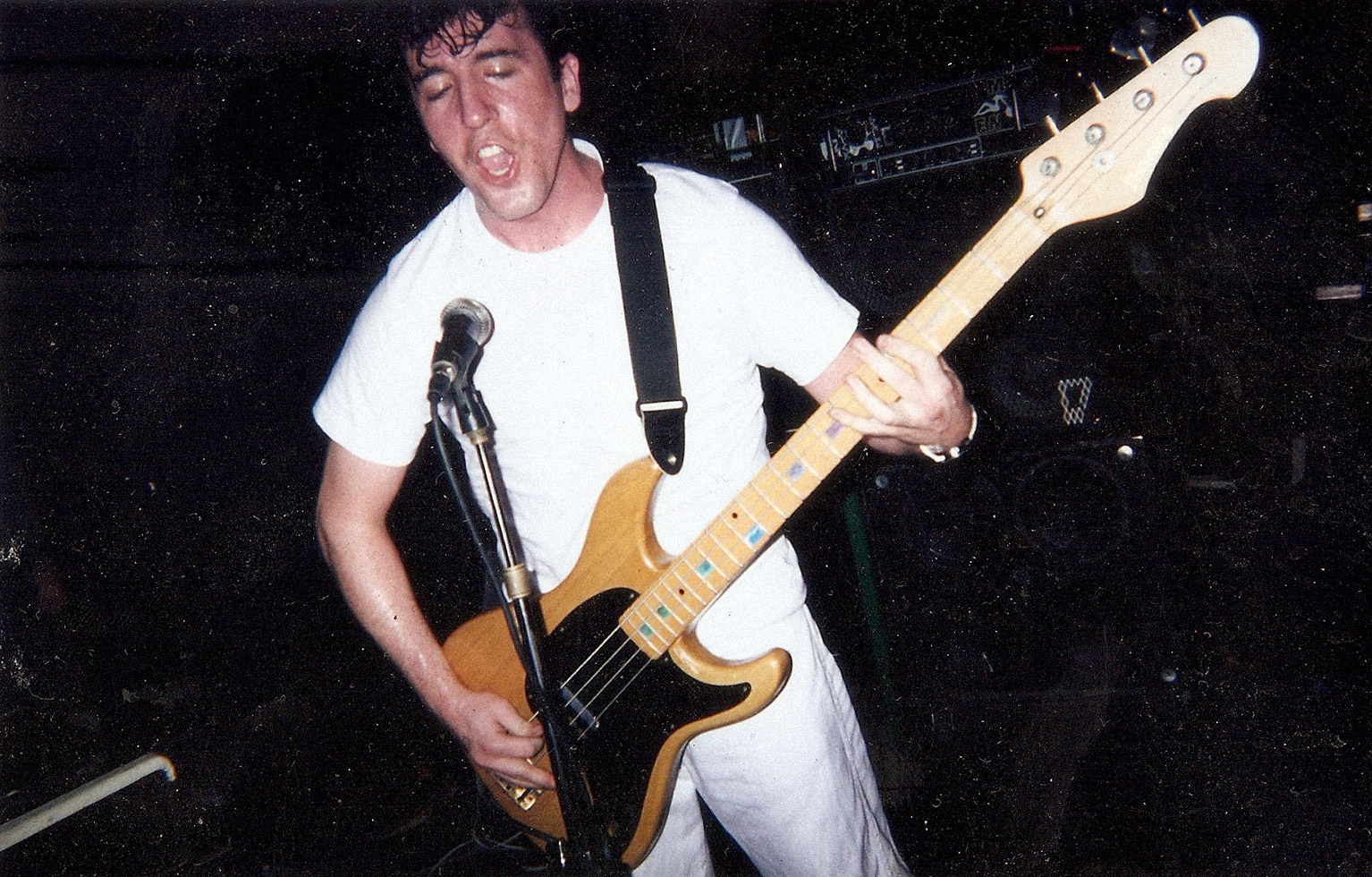
If you were going to act as a belated champion of some of the more obscure that Richmond has had to offer, what are some names that you would encourage interested listeners to investigate? Until about five years ago, Jolly Mortals was a band that I only knew as some vaguely familiar name. Picking up old local compilations and digging through credits on Discogs—What other bands was this person in? What did Mark Miley record that I've never heard of?—has led me to so many Richmond projects that I had no clue existed. Anything from Aurora Paralysis to Mulch. There's a lot.
One of the bands in the last few decades from around here that I thought really had their own thing going on is called Gilmore Guys, though I call them the "Gilmore Boys." Some of the first Hex Machine shows we did were with them when they were called Bunny Rabbits. They very much reek of Ween, Flipper, Happy Flowers... the first time I saw them the singer was using a walker and perched up at the mic stand, but I just thought that was part of the act—which it was for me. One of the guys played bass in the Jolly Mortals and is now in Delicate Whip. The guitarist is now in Chest Hair. I have a CD of Gilmore Guys somewhere. Richmond has a scene with lots of weird music, which is great. I would have loved to produce an album with them.
To be thorough... Ipecac was one of those bands that got away. That should be survived by an album that would surely hold up to this day, because the 7"s surely do. They presented themselves as a hardcore band and played with hardcore bands, because that was the scene... but musically they're also peeled out of pages of the Voïvod songbook... and that covers a ton of ground unto itself.
More Fire for Burning People was a band that had a cool thing going on that has music out there... I hear a Sonic Youth/Slint thing happening when I listen back. It's rather experimental in its own ways. They could have entertained a larger audience.
I met these guys that called themselves The Trouble With Larry and briefly entertained the idea of being their bass player. They were much older at the time and this was like 30 years ago. They have quite a few singles out there somewhere, and an album, I believe... it's kind of like if Hank Hill fronted Big Black and had Misfits musical leanings. I don't imagine people saw them as the latter, but... they had a song called "Kennedy Death Car" that I liked. I saw them once. They should have done an album with Albini, for sure.
On that note, I met and recorded a song for a band called Hegoat (for a tape compilation) that is otherwise survived by a 7" that Albini recorded. It was released by Allied, which was a label the artist John Yates (Alternative Tentacles, Punk Note) had. They surely could have made a decent full-length record. Maybe it just was never released. I don't know. They very much sounded like The Jesus Lizard.
Sliang Laos, Slang Louse... you could talk about that at length. It's almost Greek in its construct as to why they're only officially survived by a 7". The recordings I have... some of these 8-track demos... it's legend. It's also where the confidence to release gritty (dual) 8-track recordings these days comes from. I know many people know about them, but this is the updated bump in the thread. Look 'em up.
David [from Jolly Mortals, HRM, etc.] was involved in an obscene amount of names on paper, but as far as what jumps out... he was in a band called the Ultimate Dragons, which ultimately turned into The Sword. There was a release as The Fresh-o-matics, he had a duo called 15-on-the-15 that played quite often, there was a short-lived band called Ne*vozzub, Typecast, Lunchpail (I was briefly in this for a day)... this will descend into ridiculousness rather fast... you get the idea.
David has lived in Austin for many years now and one of the bands he was in I saw down there called Ratking. They were pretty great and the band also featured the Gorilla Biscuits drummer and current Unsane bass player. When they soundchecked on stage (opening for Helmet), when the soundman asked what they wanted in the monitors, all four other members just said, "Put David in all our monitors." So, that's saying something of what he brings to the table.
I only have one experience with Mark [Miley] and that was sitting in on a mastering session with the aforementioned tape compilation. I know he's still playing drums, but as far as credits and associations go, it's a little hazy at this point. For trivia's sake, there is Aurora Paralysis alumni in both Hex Machine and Human Thurma.
Toward the end of Human Thurma, I believe you did a U.S. tour with Melt-Banana, recorded three tracks in San Francisco with Tim Green at Louder Studios, and then you personally ended up moving to San Francisco for a stretch, too. I don't know, however, the order of events nor the hows/whys of Human Thurma coming to an end. Given that you had recorded some new material, it would suggest that the band still had some proverbial "irons in the fire." How did the reality of the end pan out compared to what you were actually hoping was going to transpire at the time?
The manifestation of that tour was really a result of what I'm talking about with all the other work and reward systems inside of doing this business. The tour was championed by someone who saw the band, really got what we were doing, and befriended us. Kinda sized us up and gave us the tools to have this great experience. He believed in the band and gave us the chance to jump through the hoops to make it happen, and we did. The results of the tour made it painfully clear there was a whole world beyond our cool little town, and that if you loved music there were other cities where people were just living for it. We ended the tour in the Bay and a few of us just felt like we got bit by the beauty and the vibe and the opportunity to grow out there. Again, there's quite a number of factors at work here which led to a lineup change prior to the tour, part of which I think I creatively address in the liner notes of the album. I think we were treated to one of the better tours I've ever been on, and when we arrived back in Richmond it was winter and the momentum just rolled right into the idea of moving to California in place of attempting to book a tour right away and keep going.
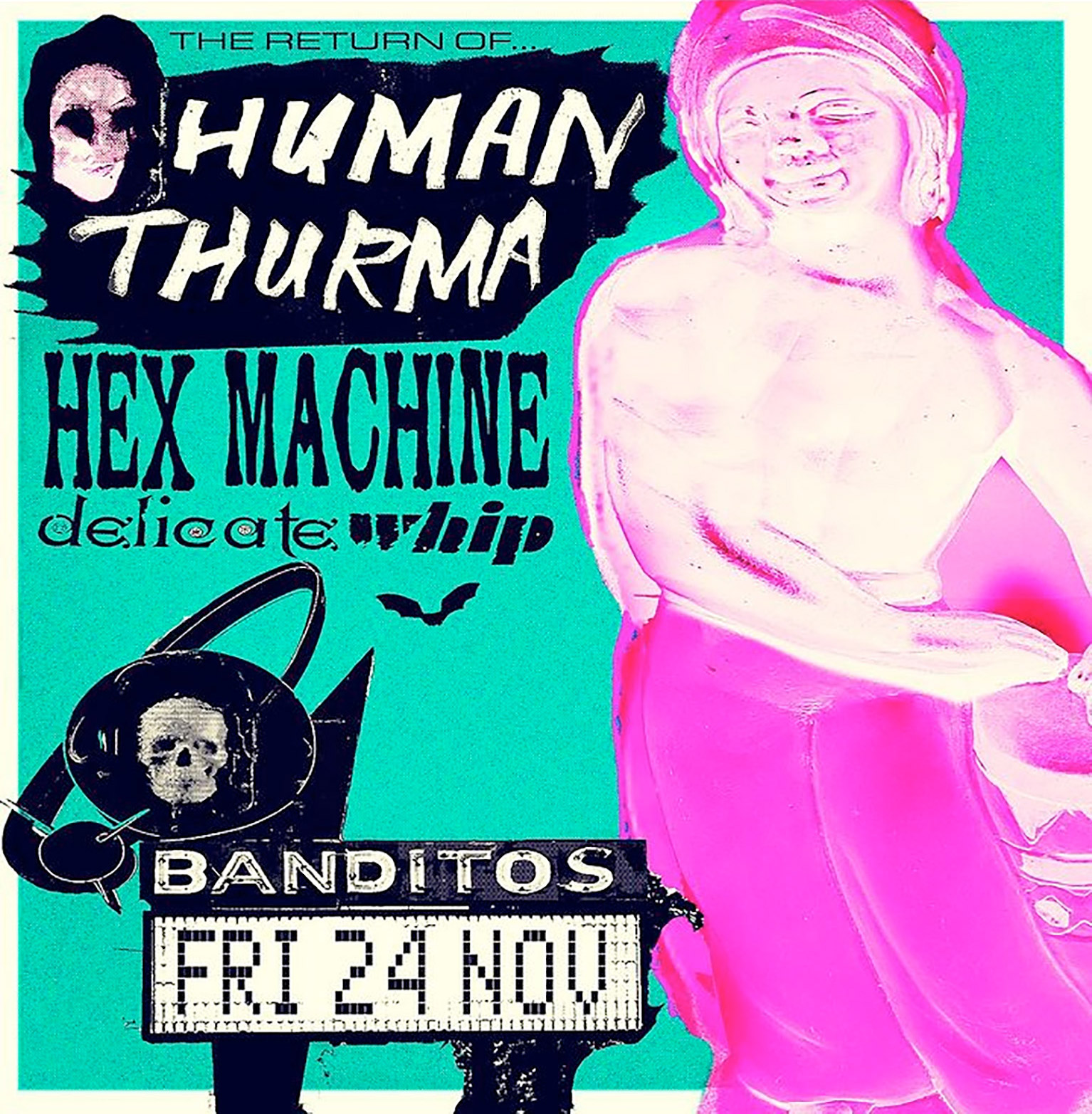
Before I found out about this Human Thurma reissue, I saw the flyer on Instagram that Human Thurma's doing a reunion show with your other band, Hex Machine, in November that coincides with the release date. What brought this all on now, 25 years after Human Thurma's final recordings were laid down?
Fast forward a few years from the tour and I'm now living in Los Angeles. There were a few attempts to get quite a few bands going and there was always an element that was not presenting itself. I found myself thinking, "We really should have put this album out already," and I made a mockup of the record that looks pretty similar to what we're releasing. This was not too long before I came back to Richmond. When I came back, the climate here had changed. That feel in the air that really fueled the band was not quite there. I had definitely changed and was now playing guitar all the time. I had made quite a few demos in the years since the tour and really grown into my own voice. I was constantly writing lyrics and recording parts of songs into a sampler and would just play to that. I thought maybe if there was a possibility we'd play again, I would look into making a CD (everybody was all CDs then), but it just got put on the back burner.
Hex Machine for me was the bridge from where we were then, and I have always seen this whole timeline as being essentially a progression of the same band I was in all those years ago. You know, there's been some natural artistic growth, but it's coming from that same place. Fast forward again to around three or four years ago... Erik and I started playing again, just the two of us. At first I was kind of like... we're moving forward again with what we do in that guitar/drums arena, and the next thing you know... it's Hex Machine. We've since piled up dozens of songs, have an album's worth of material to record and then... one day I'm thinking... "Sean lives in NYC now, but pops into town a couple times a year," and we just said, "We're all set up... all you have to do is show up and see what happens." The idea then reared its head to sequence and master the album and put it out. That was about six months ago. So, we set a date and it's kinda like Parliament and Funkadelic. They're different now, but we're gonna weird with it all the same.
Is it accurate to infer that—as time and circumstances might allow—the door is remaining open on the future of Human Thurma?
The door is open right now to play the next night as a matter of fact. I just think it took a while to be in a place to do this, and so... you weigh the possibilities moving forward. Part of what held Hex Machine back was that... we would joke... you're carting $10,000 worth of gear 1,000 miles to get paid $100. But it's not funny. There's only so much of that you can take. So... if it makes sense to do and we want to do it... I'd like to think we'd consider giving it a go, you know?
A number of these tracks were never released. What led to the stockpile of recordings rather than tacking another song or two onto 7"s back in the day?
When we would do these recording sessions, at first we were basically renting tape. We were recording over old sessions so it wouldn't cost so much, and we would record a bunch of songs even if we'd recorded it already, because... we were growing as a band and the songs sounded that much better each time. We were writing new songs, but there were all these songs we were playing and it was just... how does that sound now? So, we ended up with versions and fucked with songs in mixing and what you end up with now is like... it sounds like that band that I wanted to be in that I described early on.
As far as tacking on songs on 7"s... certain bands I paid close attention to would release a couple singles and then an album and then later put all of it on a CD. I was definitely a 7" guy, I still have quite a number of them, but you can only put so much music on those before the sound really turns brown.
Only semi-related, but speaking of unreleased recordings, I can't resist: the last time I interviewed you there was already another completed Hex Machine album called Violent Chrysanthemum. Four years later, that album also remains unreleased. What's the story there, and what's going on with Hex Machine in general these days? You mentioned that former Human Thurma drummer Erik Josephson has now joined you in Hex Machine, for example.
Considering the stockpile of recordings and feeling when the time is right... I feel like I've lived through quite a number of trends and peaks and valleys of interest in things of this ilk. As a band that doesn't live off of the sale of music, it's good to sit on some of this and wait to see what develops. When we recorded the material that became Cave Painting, the idea was to go on tour and then wait six months and put out another album and then go on tour. Bands are like wild animals at times, they're unpredictable and so are their audiences. Sometimes plans change, sometimes there are no plans, you just wait to get the feeling. On a local level, I think Strange Matter's closing [another Richmond venue whose fabled address was formerly home to The Nanci Raygun, Twisters, and The Back Door] ground down some momentum of having good shows to ramp up to right after we released the album, and that seemed to change the whole landscape and the ecosystem. That was the place to play. In the years since, it's been a strange time... savage, if you will... and quite frankly, no one can say "chrysanthemum." We've recorded since then, I've made different versions of artwork for it, thinking I'll just drop it one day... but sometimes it's good to let it rest a while before letting it out there.
This is the part of the long-game, the hurry-up-and-wait and see what happens. There's always someone hearing this stuff for the first time and getting excited. I still get excited at the idea of getting to be involved, and anymore that's all that really matters.
***
Human Thurma's 14-song Savage collection hits the streets on November 24 through Minimum Underdrive on limited edition CD, digital, and 180-gram black vinyl co-released by North Carolina label Made.In.Kansas. Pre-order now through Bandcamp, and find Human Thurma on Instagram.

